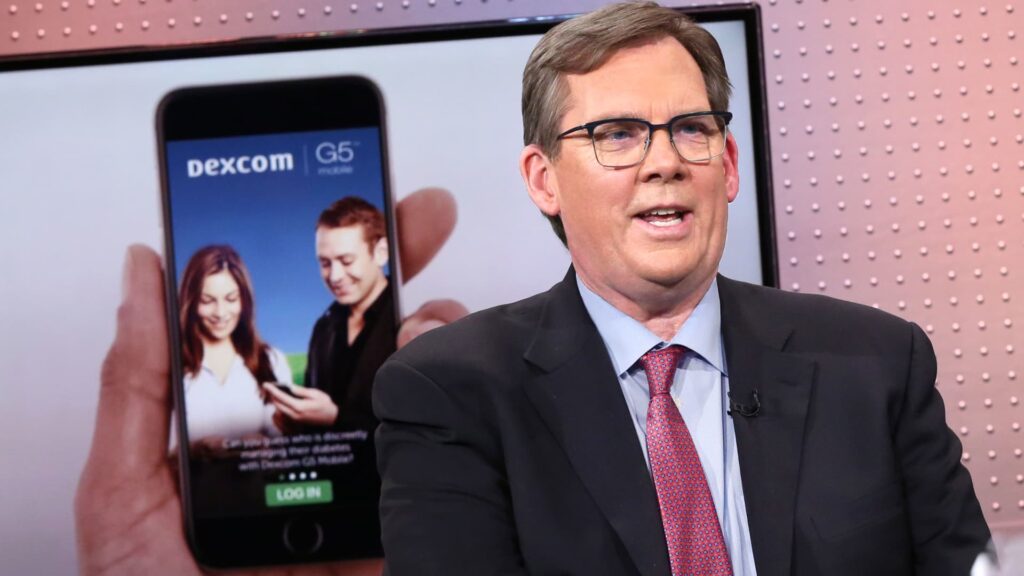Dexcon Shares of the diabetes management company fell more than 40% on Friday, their biggest drop ever, after the diabetes management company reported disappointing second-quarter revenue and provided weak guidance.
The stock fell $43.85 to close at $64, wiping out more than $17 billion in market value. Before Friday, the biggest drop occurred in September 2017, when shares plunged 33% in one day. Dexcom first went public in 2005.
Dexcom’s revenue grew 15% to $1 billion from $871.3 million in the same period last year, according to news released late Thursday. Analysts expected revenue of $1.04 billion, according to LSEG.
Investors are more concerned with predictions. Dexcom expects third-quarter revenue of $975 million to $1 billion, which includes “certain unique items impacting seasonality in 2024,” the release said. Dexcom updated its full fiscal year guidance and now expects revenue of $4 billion to $4.05 billion, down from last quarter’s forecast of $4.2 billion to $4.35 billion.
Dexcom offers a suite of tools, such as continuous glucose monitors (CGM), for patients diagnosed with diabetes. During the earnings call, Chief Executive Kevin Sayer attributed the challenges to a reorganization of the company’s sales team, fewer new customers than expected and declining revenue per user. Part of the shortage is related to customers taking advantage of discounts on a new CGM called the G7. Additionally, the company said it was underperforming in its durable medical equipment (DME) pipeline.
“DME dealers continue to be important partners in our business and we underperformed in those partnerships this quarter,” Sayer said on the call. “We need to refocus on those relationships.”
JPMorgan Analysts downgraded the stock to hold from buy on Friday and said the report marked a “sharp shift in the wrong direction.” Analysts said they still had some unanswered questions but believed the company’s performance was due to internal issues rather than to changes in the market, such as the surge in a weight-loss treatment called GLP-1.
During the question-and-answer portion of Thursday’s earnings call, JPMorgan’s Robbie Marcus pressed for more details on the sharp drop in guidance and expressed “shock” at how disruptive changes to the sales force structure could be.
“I think more needs to be done,” Marcus said, asking whether GLP-1 had had an impact.
Thayer responded that the company “currently lacks the critical mass of new patients to meet our expectations.” He said the reorganization of the sales team resulted in a change in geographic coverage that was much larger than expected because doctors now deal with different sales representatives.
In a report, JPMorgan analysts highlighted the “severity of the downside trend,” saying In fact, it “seems largely self-inflicted and difficult to fully understand.”
Regarding DME’s woes, Sayer said the company lost its “highest revenue-generating customer every year.” He added that the G7 qualified for discounts three times faster than its predecessor, the G6.
Dexcom finance chief Jereme Sylvain said all these variables combined have resulted in a $300 million shortfall in the company’s high-end guidance for the year.
“It’s certainly not something we’re happy about,” Sylvain said. He said that in the interest of “full transparency” the company needed to clarify “the impact on the remainder of the year.”
Analysts at William Blair wrote that Dexcom’s results were “disappointing,” but their long-term view remains unchanged. Dexcom is well positioned to expand the market and recoup recent share price losses, they said.
“These near-term developments should be short-lived,” they wrote in a note on Friday.
Leerink analysts agreed, writing in a note on Friday that “the extent of the sell-off is somewhat overdone” and that the issues currently hurting the company are unlikely to have a significant impact on Dexcom’s long-term trajectory.
In March, Dexcom announced new products An over-the-counter CGM called Stelo is approved for use by the U.S. Food and Drug Administration. Stelo is designed for people with type 2 diabetes who do not take insulin. Dexcom said Thursday it will officially launch in August.
With Friday’s sell-off, Dexcom shares are down nearly 50% this year, while the S&P 500 is up 15%.
watch: Dexcom cuts forecast

